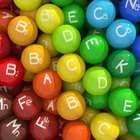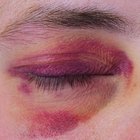
Goodluz/iStock/Getty Images
Increased penetration or absorption of copper peptides results from enhanced stability of the copper ion when bonded to two or more linked amino acid complexes. As reported in "The Journal of Applied Research," copper peptides taken by mouth improve absorption of copper 4.4 times over copper sulfate. According to the Mayo Clinic, copper peptides in cosmetics and skincare products stimulate collagen production in the skin, improve wound healing and increase antioxidant activity.
Skin Irritation
Symptoms of contact dermatitis include inflammation or irritation of the skin. According to the Mayo Clinic, cosmetics and skincare products containing copper peptides may cause redness, burning sensation or the development of a rash. Using the products according to the manufacturer's guidelines may limit skin irritation.
Digestive Tract Disturbances
Copper is stored in the liver, and the body removes excess copper either in bile through the intestines or from the kidneys. According to MedlinePlus, symptoms from taking too much copper include abdominal pain, nausea, vomiting and diarrhea.
Nervous System Toxicity
Symptoms of excess copper in the body include headache, feeling weak and tired, dizziness and mood disturbances. According to a study published in "Canadian Journal of Chemistry" in 2009, the selective binding of copper over other metals to prion protein in the central nervous system may contribute to neurotoxicity. Their research indicates that a disruption in copper-peptide binding may contribute to neurodegenerative diseases including Alzheimer's, Parkinson's and Huntington's.
Copper Toxicity
Normally, the liver and kidneys remove excess copper from the body. According to MedlinePlus, copper toxicity may result when an inability to remove excess copper from the body causes copper to collect in the organs, leading to liver failure and neurological damage. Susceptible individuals include patients with Wilson's disease, bile obstruction or Indian childhood cirrhosis. Physicians treat copper toxicity with medications to bind the copper and remove it from the body.
Related Articles

What Foods Provide Calcium D-Glucarate?

L-Lysine for Hair Growth

Can I Mix Vitamin C and Copper Peptides?

How to Remove Membrane From Chicken ...

Metal Detox & Acne

Zinc Treatment for Rosacea

Elastin Supplements

What Vitamins Help the Liver?

Bromelain & Bruising

How to Reduce Acne Inflammation

Can You Decrease Sebum With Vitamin A?

How to Get Rid of Stomach Hair ...

Are Nickel Lined Pans Safe?

How to Keep Intimacy Alive in a ...

Vitamins for Mental Alertness

Does Milk Thistle Help Skin?

How Exercise Increases Hair Growth

Golden Flax Seed Vs. Dark Flax Seed

Foods Rich in Magnesium & Phosphorus

What Are the Dangers of 6 Oxo?
References
Writer Bio
A professional writer since 2001, Lyn Michaud has been published in educational encyclopedias, including "Encyclopedia of Global Health" and "Encyclopedia of Global Warming and Climate Change." She holds degrees in biology and chemistry and spent three years as a board member for Weld City Board of Health.
Photo Credits
Goodluz/iStock/Getty Images